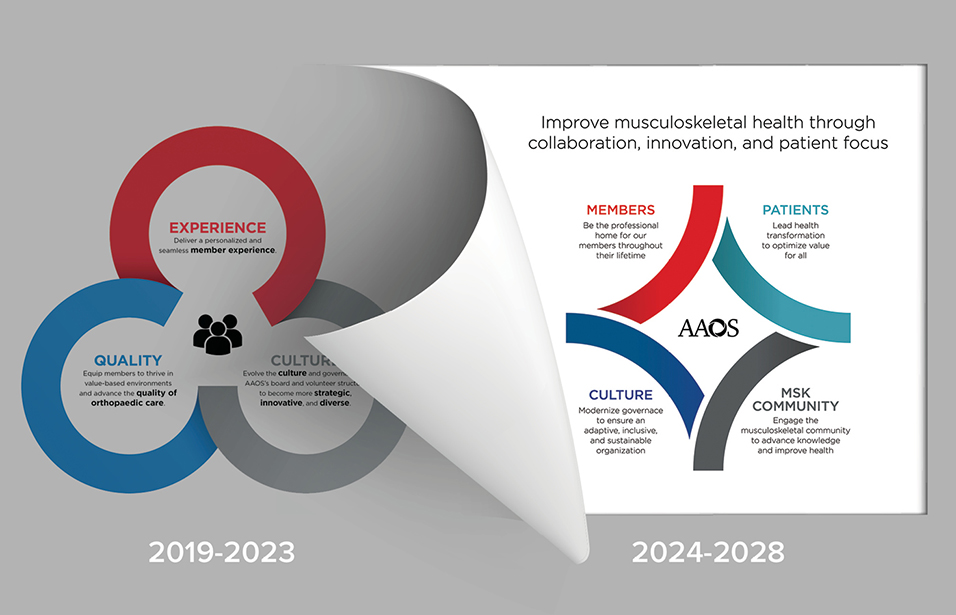
Our lives as orthopaedic surgeons and as people have changed dramatically over the past 5 years. We have lived through a pandemic that has changed our practices and our patients’ expectations. There have been large shifts in the finances and delivery of care, and practice models are evolving faster than ever. Many non–physician-led groups are entering the healthcare space, with the musculoskeletal (MSK) arena attracting billions in investments. We all recognize that our current spending on healthcare is not sustainable while at the same time overall health is not improving.
These stresses to the healthcare system are occurring while the population is aging, and the services that we provide our communities will be in greater need than ever before. All of this is to point out that our world is moving forward, and we must move with it. How we decide where to put our efforts, and more importantly where we do not, are choices that define us as surgeons and as an organization. The choices we make are our strategy and determine our identity.
For the past year, the AAOS Board of Directors (BoD) has been working diligently with input from many of our members to determine our next Strategic Plan. The prior plan was in place from 2019–2023 and had been amended once in that time to include an emphasis on diversifying our profession. As an example of how the Strategic Plan is used, once this change was made, the BoD established the Inspiring Diversity, Equity, and Access (IDEA) Grant Program® to fund pipeline projects with the goal of providing greater exposure and opportunities to populations who have not typically been drawn to our field.
The BoD evaluates adherence to the Strategic Plan quarterly using clearly defined metrics and outcomes that align with our goals. These metrics drive our efforts and actions, as Strategic Plans are important only if they lead to achieving our goals. I am pleased to report that we exceeded our objective to execute more than 85 percent of our annual Strategic Plan initiatives in all 5 years of the plan, averaging 92 percent of our goals annually. These goals represent all of our activities across membership, advocacy, education, quality, and organizational excellence.
Our next 5 years will be driven by our new Strategic Plan, which was approved by the BoD at the Annual Meeting in San Francisco. Of importance is that we have not changed our mission, vision, or core values. Our mission remains: “Serving our profession to provide the highest-quality musculoskeletal care.” The new plan builds on the prior plan while adding new components to further our mission.
Building on the successes of the prior plan, member and culture goals have become more mature. We have expanded our member goal to “be the professional home for our members throughout their lifetime,” and we are stressing bidirectional communication. It is more critical than ever that the BoD hears from you, our members, as the changes that have occurred in practice models affect what you need from the organization. Our culture goal is critical to our success and is focused on modernizing our governance to be adaptive, inclusive, and sustainable. We have a great deal of work to modernize our governance structure and processes to be able to better support our members and their patients. As an example, even a simple issue such as changing a membership category currently takes a minimum of 18 months.
The key enablers of our plan remain advocacy, partnership, communication, and technology, but language has been added to reflect a greater emphasis on patients’ overall health and partnerships that will benefit both patients and the profession. There are also more aspirational portions of the plan, including patient and MSK community goals. While we have supported patients with educational offerings such as OrthoInfo, we have not engaged directly with patients, which we will now strive to do. We wish to be a force for improving the health of ALL patients, regardless of their financial or social situations, by influencing healthcare delivery and finance models as healthcare transforms. Engaging patients will also help us demonstrate the value of what we do, as what’s good for our patients is good for us. Each council and committee chair will evaluate how we might engage patients as well as other groups interested in MSK care.
While our orthopaedic specialty societies are specifically and purposefully called out in the new plan as necessary partners, but we will also look outside of our normal relationships. There are many other professionals who are active in the MSK space, and leveraging our knowledge and abilities to partner with others to effect positive change in MSK care will allow us to better advocate for our field. In particular, we seek to be involved in educating others, developing evidence surrounding care options, and advocating nationally for funding and support for MSK research and care.
Although we recognize that many healthcare professionals see and treat patients with MSK conditions, our most important goal remains clearly stated in our vision statement, to be the “trusted leaders in advancing musculoskeletal health.” By doubling down on our commitment to our members and a new emphasis on patients and the broader MSK community, we will embark on an exciting journey over the next 5 years. The continued work we will do to modernize our governance structure and processes, to be more knowledgeable about our members’ challenges in caring for their patients, to be more efficient in making data-driven decisions, and to actively build a bench of future leaders will put us in a position to best respond to the rapid changes in our environment. I expect that the 2024–2028 Strategic Plan will evolve annually as the dynamics of our profession change, but we have a thoughtful, purposeful, and comprehensive plan that will start us in the right direction.
Credit for the work on the strategic plan should go to the entire 2023–2024 AAOS BoD, with Past President Kevin J. Bozic, MD, MBA, FAAOS, and BoD Lay Member Lisa N. Masters, MBA, leading a devoted Strategic Plan project team throughout the past year to provide the BoD with the data needed to be confident in their decisions. The work was done dutifully, carefully, and with insight from hundreds of volunteers, all of whom deserve credit! Now, we move forward.
Paul Tornetta III, MD, PhD, FAAOS, is the 2024–2025 AAOS president and the director of orthopaedic trauma at Boston Medical Center. He is also professor and chair of the Department of Orthopaedic Surgery at the Chobanian & Avedisian School of Medicine of Boston University.
